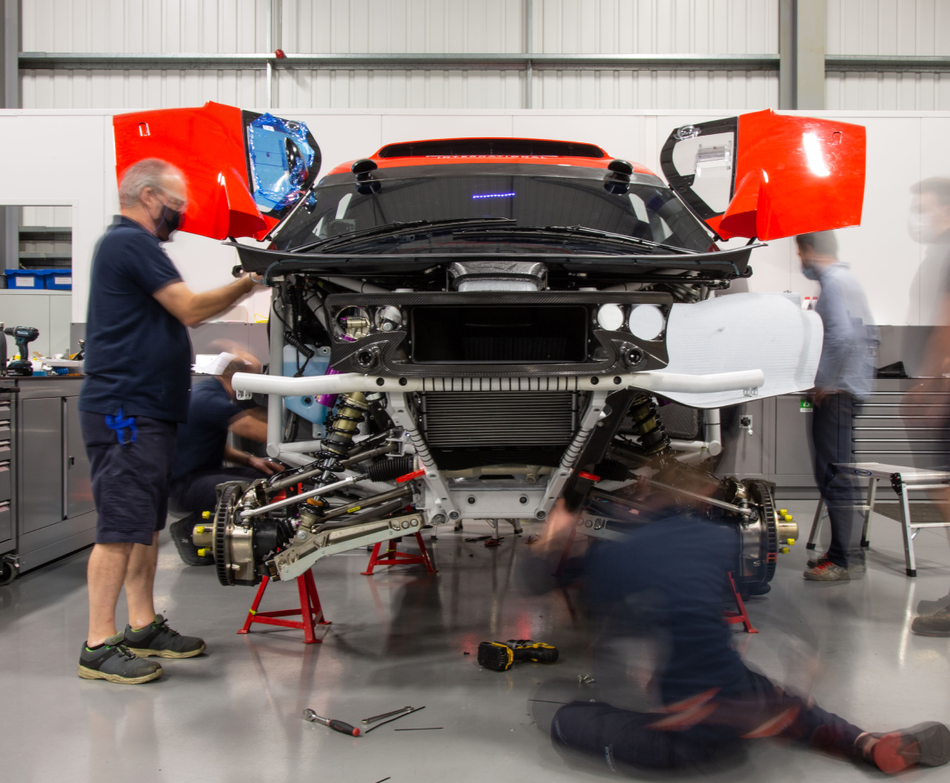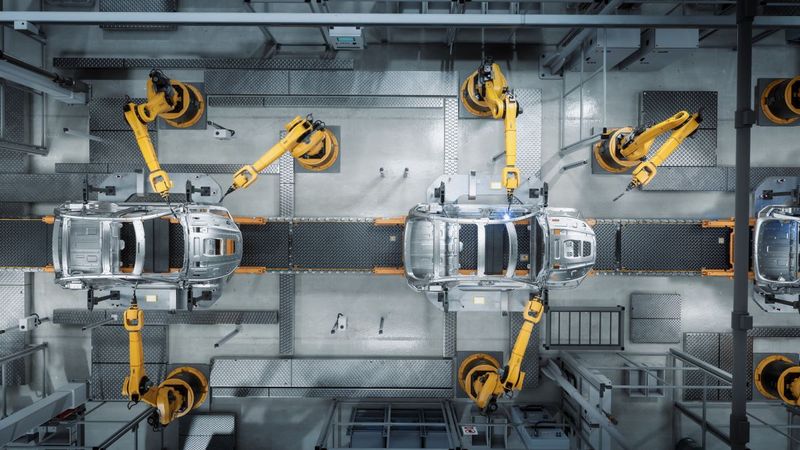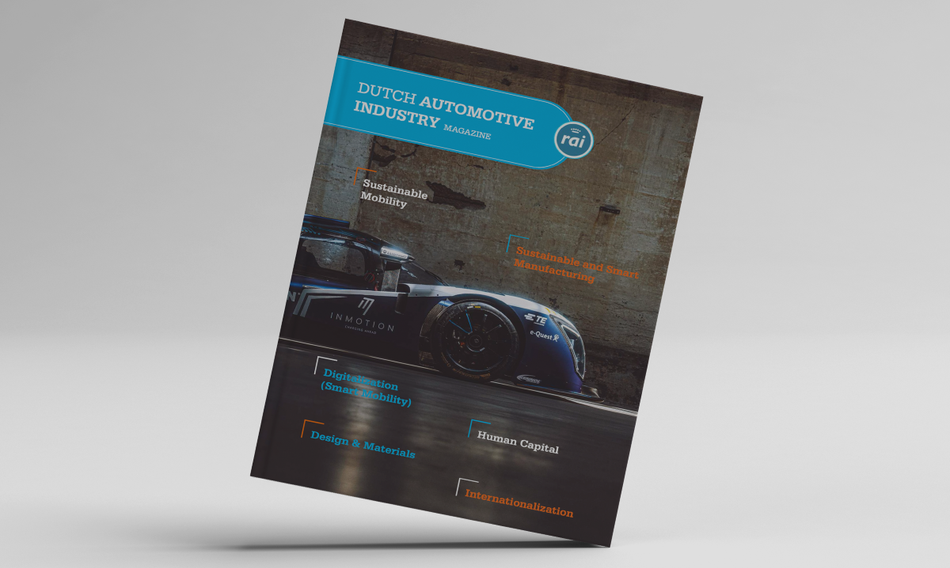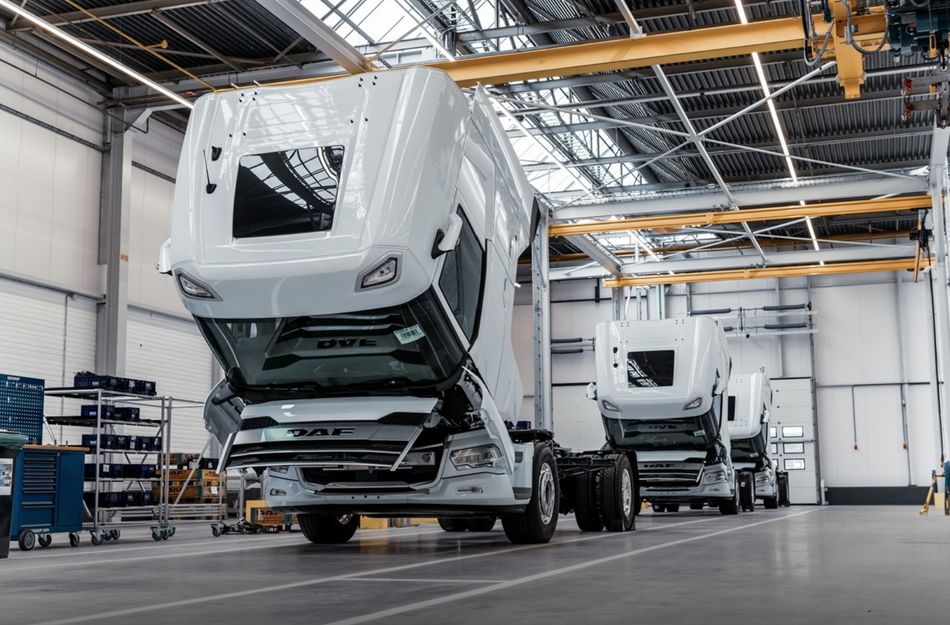Sustainable and Smart Manufacturing Enabling a Competitive Dutch Automotive Industry
The Dutch automotive industry is evolving at an unprecedented pace, driven by digitalization and advanced technologies redefining manufacturing processes and competitive dynamics.
We are pleased to introduce the latest edition of the RAI Automotive Industry NL report, which provides an in-depth exploration of the Dutch automotive sector's transformative trajectory. This sector, situated at the nexus of rapid technological advancements and pressing global challenges, exemplifies a model of innovation, sustainability, and resilience in a highly competitive international landscape.
DOWNLOAD THE FULL INDUSTRY REPORT
The report covers core themes: smart and green mobility, sustainable manufacturing, human capital development, design and materials, and internationalization. Each of these pillars underscores the industry's commitment to integrating advanced technologies into mobility solutions, driving the future of transportation with a focus on efficiency, safety, and sustainability.
Below you can read an excerpt of one of the featured articles. Or download the full report for free.
The Role of Digitalization in Dutch Automotive Manufacturing
Digitalization has enabled the Dutch automotive industry to overcome the challenges posed by high labor costs. Technologies such as digital twins, automation, Artificial Intelligence (AI), augmented reality (AR), and virtual reality (VR) are integral to these systems, enabling high efficiency and reduced labor costs. Digital twins, for instance, allow manufacturers to create virtual replicas of physical assets, processes, and systems. This technology helps optimize production lines, predict maintenance needs, and improve overall operational efficiency.
In a conversation with Jean Pierre Heijster, section manager at RAI Association and responsible for Smart and Sustainable Manufacturing and an automotive industry expert, he discussed how the Dutch automotive industry is leveraging digitalization to enhance its manufacturing processes.
"The Netherlands is quite an expensive country in terms of labor costs," Heijster notes. "Yet, we are still a relatively big manufacturing country. This is only possible with our highly digitalized production system."
Embracing advanced digital technologies is at the core of the Dutch automotive industry’s evolution. The integration of AI, robotics, AR, and VR in production has been a game-changer. These technologies facilitate a highly automated, smart manufacturing environment that offsets the high labor costs and enhances productivity. Heijster explains that these advancements are crucial for The Netherlands to remain competitive, especially in producing complex systems with high-mix, low-volume outputs.
Robotics and AI are particularly significant in this context. Robotics enhances precision and speed in manufacturing processes, while AI provides the capability to analyze vast amounts of data to improve decision-making and efficiency. For example, AI-driven predictive maintenance can foresee potential equipment failures before they occur, reducing downtime and maintenance costs.
This competitive edge is particularly evident in adopting additive manufacturing (AM). While not adopted for the high-volume production of commodity parts, AM is revolutionizing the production of high-complexity, low-volume components.
"We can see its use with metal printing and plastic printing for both automotive parts and tools," says Heijster. "This enables 3D-printed parts to have higher quality in terms of their materials and material properties."
Additive Manufacturing and Its Impact
Additive manufacturing (3D printing) has been a part of the Dutch automotive industry's toolkit for decades, primarily in prototyping. However, its role is expanding significantly. AM allows for the creation of complex geometries that would be impossible or prohibitively expensive to achieve with traditional manufacturing methods. This is particularly useful for producing bespoke parts for high-end or specialized vehicles.
With the growing demand for more complex and personalized parts, shortening production cycles, and sustainability becoming more critical than ever, traditional supply chains face significant challenges. In essence, industry production demands are intensifying. Lately, more companies have adopted AM for actual production rather than just prototyping. This shift is driven by the need for greater customization and the ability to produce parts on demand, reducing the need for large inventories.
Particularly in high-mix, low-volume (HMLV) production, AM offers unparalleled flexibility and efficiency. HMLV manufacturing involves creating a wide range of products in small quantities. This approach is typically used to produce unique and complex items that meet specific quality standards. For instance, luxury car manufacturers are increasingly using AM to produce customized interior components and intricate engine parts.
The implications of AM extend beyond manufacturing. It also plays a critical role in the maintenance and repair sector. With the ability to produce parts quickly and on-site, AM reduces vehicle downtime and dependence on large, centralized production facilities. This decentralization of production capabilities can lead to more resilient supply chains, a crucial advantage in the face of global disruptions.

The evolution of AM technology continues to break new ground. Lightweighting is a significant trend in the automotive industry, particularly with the rise of electric vehicles that require lighter structures for improved efficiency. AM enables the creation of stronger and lighter parts than traditional methods, which is crucial for both high-performance (e.g., race cars and luxury models) and heavy-duty vehicles (e.g., trucks). These vehicles often require specialized, customized parts that can benefit from the unique advantages of AM, such as producing complex geometries that enhance performance while reducing weight.
The Dutch automotive industry’s commitment to sustainability and circularity is significantly bolstered by AM. By enabling localized production, AM reduces the emissions associated with transporting parts over long distances. This localization cuts down on transportation emissions and allows for more efficient use of materials, thereby minimizing waste and promoting a more sustainable production process. The application of AM in producing low-volume, high-value parts, especially for electric and luxury vehicles, highlights The Netherlands' strategy of integrating advanced technology with environmental goals.
This plays a significant role in maintaining the Dutch automotive industry's competitive edge. The synergy between AM and other digital technologies, such as AI and robotics, enhances the capabilities of smart manufacturing systems. This integration improves efficiency and productivity and supports the industry's sustainability and climate neutrality goals.
Sustainability Through Remanufacturing and Recycling
The Dutch automotive industry's commitment to sustainability is evident in its robust recycling and remanufacturing practices. Heijster highlights that at least 98% of a car's parts are recycled in The Netherlands, placing the country at the forefront of automotive sustainability in Europe and possibly the world. This high recycling rate is a testament to the industry's dedication to reducing its environmental footprint.
Applying the principles of the Six R’s (rethink, reduce, reuse, remanufacture, recycle and recover), the industry has long embraced the reuse of automotive parts. “Remanufacturing was prevalent in the ’50s, the ’60s, and the beginning of the ’70s. Every single car manufacturer had a remanufacturing department for gearboxes, alternators, motors, steering housing, water pumps, and so on,” explains Heijster.
“From the mid-’70s until about five-ten years ago, parts were produced with low complexity and high volume and made in relatively low-cost countries.”
With the industry’s current tendency towards circularity, we will see new ways of bringing parts back into the loop. This approach is being revitalized by the EU's new legislation and circular economy action plan, which encourage remanufacturing and circularity. In fact, a lot of remanufacturing currently takes place in The Netherlands, especially powertrain parts, where many companies remanufacture such parts in highly automated systems. DAF Trucks, for example, has a dedicated remanufacturing department poised for growth in the coming years to ensure not only reusable products and parts but also the tools and equipment necessary for remanufacturing.
While remanufacturing helps conserve materials and energy, it also offers a cost-effective alternative to new parts. The Dutch automotive industry is leveraging advanced technologies to enhance remanufacturing processes. Automated inspection and refurbishment systems ensure that remanufactured parts meet stringent quality standards, while digital tracking systems help maintain a clear record of each part's history. The Netherlands has quite a good number of great companies and players who are building towards a more sustainable automotive industry by leveraging sustainable practices and smart manufacturing.
One such player is VDL, a member of RAI Association. VDL Group is at the forefront of smart manufacturing in the Dutch automotive sector, leveraging advanced technologies to enhance production processes. Mr. Henri Koolen, executive vice president at VDL, emphasizes the importance of integrating automation and digitalization into manufacturing. "At VDL, we focus on creating highly flexible production lines that can quickly adapt to changing market demands," Koolen states.
One notable example is VDL's implementation of a fully automated assembly line for electric vehicle components, which significantly reduces production time while maintaining high-quality standards. "This level of efficiency is crucial for The Netherlands to remain competitive globally," he adds.
Reflecting on the current state of the Dutch automotive industry, Koolen notes, "The industry is undergoing a transformative shift towards sustainability and innovation, driven by digital technologies." Looking ahead, he predicts, "In the next 5-10 years, we will see a substantial increase in smart manufacturing practices, with AI and robotics becoming integral to production. This evolution will not only enhance operational efficiency but also support our sustainability goals."
DOWNLOAD THE FULL INDUSTRY REPORT
Expanding Horizons in Sustainable and Smart Manufacturing
As the Dutch automotive industry continues to evolve, the integration of sustainability and smart manufacturing technologies becomes more central to this transformation. This involves optimizing production methods and resources and leveraging cutting-edge technologies to forge positive contributions to societal and environmental challenges, such as carbon emission reduction. Not only does this forward-looking approach address the environmental challenges, but it also ensures that the industry remains competitive on a global scale.
The evolution of AM and the integration of digitalization technologies, such as AI, robotics, digital twins, and augmented reality (AR), will be core factors in revolutionizing the manufacturing processes within the Dutch automotive industry. These technologies enable the creation of smart manufacturing systems that enhance efficiency, reduce labor costs, and improve overall operational productivity.
From digital twins providing virtual replicas of physical assets to optimize production lines to AI-driven predictive maintenance foreseeing equipment failures, such technologies can help reduce downtime and maintenance costs, thereby enhancing operational efficiency. Robotics are also particularly significant in this context. Robots can enhance precision and speed in manufacturing processes, while AI analyzes vast amounts of data to improve decision-making and efficiency. This integration of advanced technologies ensures that the Dutch automotive industry remains at the cutting edge of innovation, particularly in producing complex systems with high-mix, low-volume outputs.
The Dutch automotive industry is poised to further integrate digitalization, smart manufacturing, and sustainability into its core operations in the coming years. By harnessing the power of data, Dutch automotive manufacturers can optimize every aspect of their operations, from design and production to maintenance and recycling. The emphasis on high-complexity, low-volume production is likely to expand, driven by the demand for personalized automotive solutions. The continued evolution of remanufacturing and recycling practices will support the industry's sustainability goals.
The synergy between AM and digital technologies, such as AI and robotics, enhances the capabilities of smart manufacturing systems and supports the industry's goals of sustainability and climate neutrality. The Netherlands is well-positioned to lead this transformation, setting benchmarks for global automotive innovation. The commitment to circularity and climate neutrality ensures that the Dutch automotive industry remains a pioneer in combining advanced technology with sustainable practices, paving the way for a resilient and eco-friendly future.
Interested to know more? Join forces with RAI Association.
The Netherlands' embrace of digitalization and commitment to sustainability are key drivers of its competitive edge in the global market. It is also expanding its global footprint through international collaboration. By partnering with leading automotive hubs worldwide, Dutch companies are accessing new markets and technologies. These collaborations facilitate the exchange of knowledge and best practices, further enhancing the industry's innovative capacity.
RAI Automotive Industry NL is at the forefront of Dutch automotive innovation, bringing together industry stakeholders to drive advancements in green mobility, smart mobility, manufacturing, materials, human capital, and international business development. Their initiatives focus on sustainable and intelligent solutions, leveraging cutting-edge materials and technologies to achieve zero emissions, reduce traffic congestion, and enhance road safety. By collaborating with government bodies, knowledge institutions, and international partners, RAI Automotive Industry NL aims to maintain The Netherlands' leadership in global automotive innovation.
Learn more about the work of the RAI Automotive Industry NL's members by downloading the full report below.



